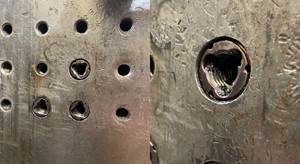Could the Plastics Industry Become Collateral Damage in a Trade War?
The plastics industry is a global one, and at this time, it’s caught in the transcontinental crossfire of a slow simmering trade war.
On the same day, when in Mexico City, Perc Pineda, chief economist of the Plastics Industry Association (PLASTICS) walked through the extensive trade ties in plastics shared between the neighboring countries—$28 billion of cross border plastics shipments in 2018—interim PLASTICS President & CEO Patty Long released a statement from Washington outlining the negative impacts of a closure of the U.S./Mexico border.
The statement, entitled, “Plastics Industry Warns Against Closing U.S.-Mexico Border,” didn’t mention what precipitated its release: President Trump’s threat five days earlier to close the U.S./Mexico border. Instead, in three paragraphs and just under 200 words, it laid out the potential harm such an action would inflict on the economies of both countries.
“Even more damaging is the uncertainty that such a move would create—disrupting short-term operations and creating doubt for the customers of American companies who need to know that their supply lines won’t be impacted by government action.
Speaking at Plastimagen, Latin America’s largest plastics exhibition, Pineda described a thriving plastics sector, which seemed to be booming despite being beset by consumer backlash against litter’s environmental impact and uncertainty about trade flows. The latter has been exacerbated by the Trump administration’s aggressive trade stance, specifically around NAFTA and China, with Canada, Mexico and China representing the U.S.’s three largest trading partners in plastics.
Pineda pointed his Plastimagen audience towards three areas of concern for plastics trade uncertainty going forward:
- Economic growth globally was showing signs of a slowdown.
- The then (and still) unresolved U.S./China trade dispute.
- Brexit uncertainty.
Pineda expounded on some of the potentially positive changes going from NAFTA to a new USMCA trade agreement could have for plastics, including:
- Country of origin rule change. Under the proposed deal, 75% of auto components would need to be made in the U.S./Mexico/Canada—up from 62.5%.
- With the proposed USMCA all three countries would have more flexibility, which should promote an increase in trade.
The USMCA has not yet taken up by congress, but if it were, the agreement could potentially be finalized in 2020.
“Policy Headwinds”
Following the juxtaposition of PLASTICS calling for open trade with Mexico while the White House sought to completely shutter the border and halt the flow of people and goods, two publicly traded suppliers of hot runners that are reliant upon the automotive industry delivered first quarter earnings reports that reflected the negative impact the uncertainty of global trade was having on their businesses.
On April 26, the Barnes Group, which holds Synventive, Männer and Foboha in its Molding Solutions business, saw first quarter sales drop 10% over the final quarter of 2018, specifically citing softness in demand for automotive hot runners and trade and tariff concerns. Barnes saw a pull back by OEMs with respect to launching new vehicle programs, and subsequently, the new tools—and hot runners—that are required. Barnes noted that automotive hot runner sales finished the first quarter down in the “20s”, percentage wise.
Four days later on April 30, Milacron cited trade uncertainty as a negative influencer. CEO Tom Goeke went Dickensian, talking about 2018 as a “tale of two halves” with the second half of the year, negatively hurt by trade concerns. The company’s hot runner business, which falls under melt delivery, saw projects being initiated but not closed out. Guidance for 2019 remained unchanged but Goeke did note that markets are still working their way through “policy induced headwinds.”
The companies that make cars, and all manufacturers that support their supply chains, are global businesses through and through. If longstanding rules that govern their businesses in various countries are suddenly in flux, these companies are smart to see where it makes the most sense to manufacture once new rules are in place. Waiting to see how all this shakes out could put the global plastics industry in a holding pattern. Companies with manufacturing in Windsor, Detroit, Querétaro and Shanghai are smart to see what any new trade rules might hold before they commit to a new vehicle program in any one location. That could mean a slow down for plastics in the interim, however.
Related Content
Neste, Borealis and Covestro Plan to Make Polycarbonate From Recycled Tires
Companies announced agreement that will use advanced recycling to convert old tires into new PC-suitable for automotive applications.
Read MoreMolder Repairs Platen Holes with Threaded Inserts
Automotive molder ITW Deltar Fasteners found new life for the battered bolt holes on its machine platens with a solution that’s designed to last.
Read MoreAutomotive Awards Highlight Emerging Technologies
Annual SPE Automotive event gives nods to several ‘firsts’ as well as sustainability.
Read MoreCarbon Fiber Reinforced Nylon 12 for Injection Molding
CRP Technology’s new composite is 100% recycled from Windform XT 2.0 IMG industrial 3D printing material.
Read MoreRead Next
Beyond Prototypes: 8 Ways the Plastics Industry Is Using 3D Printing
Plastics processors are finding applications for 3D printing around the plant and across the supply chain. Here are 8 examples to look for at NPE2024.
Read MoreSee Recyclers Close the Loop on Trade Show Production Scrap at NPE2024
A collaboration between show organizer PLASTICS, recycler CPR and size reduction experts WEIMA and Conair recovered and recycled all production scrap at NPE2024.
Read MorePeople 4.0 – How to Get Buy-In from Your Staff for Industry 4.0 Systems
Implementing a production monitoring system as the foundation of a ‘smart factory’ is about integrating people with new technology as much as it is about integrating machines and computers. Here are tips from a company that has gone through the process.
Read More


























